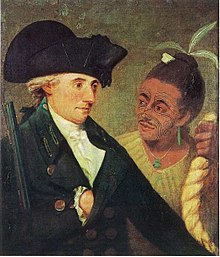Charles Clerke
Charles Clerke | |
|---|---|
 Charles Clerke, by Nathaniel Dance-Holland, 1776 | |
| Born | 22 August 1741 Essex, England |
| Died | 22 August 1779 (aged 38) |
| Allegiance | |
| Service | |
| Rank | Captain |
| Commands | HMS Discovery HMS Resolution |
| Battles / wars | Seven Years' War |
Captain Charles Clerke RN (22 August 1741 – 22 August 1779) was an officer in the Royal Navy who sailed on four voyages of exploration, 3 with Captain James Cook. When Cook was killed during his 3rd expedition to the Pacific, Clerke took command but died later in the voyage from tuberculosis.
Biography
Clerke started studying at the Royal Naval Academy in Portsmouth when he was 13. During the Seven Years' War he served aboard HMS Dorsetshire and HMS Bellona. He was in the mizzen-top of HMS Bellona when the mast was shot away in 1761 and he became the only survivor of those who consequently fell overboard.[1]
In June 1764 he joined Captain John Byron, aboard HMS Dolphin, on Byron's expedition to explore the Pacific. The Dolphin returned in May 1766. Its circumnavigation of 22 months was the shortest up to that point. Upon his return Clerke published an account of encountering Patagonian giants, a hoax which the Dictionary of Canadian Biography attributed to his high spirits.[2]
Clerke's last three voyages were all under the command of Captain James Cook. He started the first voyage aboard HM Bark Endeavour (1768–1771) as a master's mate. Cook promoted him to acting lieutenant in 1771, and he was officially confirmed in that rank on 31 July 1771. He was HMS Resolution's second lieutenant on Cook's second voyage (1772–1775).
While ashore between Cook's 2nd and 3rd voyages Clerke agreed to serve time in the King's Bench debtor's prison for a debt one of his brothers, Sir John Clerke had incurred. While in debtor's prison he was infected with the tuberculosis that eventually killed him.[3]

For Cook's third expedition, Clerke was placed in command of HMS Discovery, receiving this command on 26 August 1775. When Cook was killed in a skirmish with Hawaiians on 14 February 1779, Clerke took command of the expedition and of HMS Resolution. He continued the expedition's exploration of the Northern Pacific coast, searching for a navigable Northwest Passage. The expedition then proceeded to the Pacific coast of Siberia. Lieutenant James King, one of his subordinates, wrote that Clerke's illness had reduced him to skeletal thinness. Clerke died from tuberculosis on his 38th birthday (22 August 1779) en route to Kamchatka from the Bering Strait. He was buried in Kamchatka on 29 August 1779. Clerke's second in command, Lieutenant John Gore took command of the expedition as captain of Resolution, appointing King as captain of Discovery. The expedition then sailed via China and the Sunda Strait to Cape Town, returning to England in August 1780.[4]
In 1913, the British Admiralty erected a small obelisk in Clerke's honour at Petropavlovsk-Kamchatskiy, Russia, with an inscription in English.[5][6][7]
See also
Footnotes
- ^ The Captain Cook Encyclopædia, p. 61. John Robson. Random House Australia. ISBN 0-7593-1011-4.
- ^ biography from the Dictionary of Canadian Biography
- ^ The Captain Cook Encyclopædia, p. 62. John Robson. Random House Australia. ISBN 0-7593-1011-4.
- ^ Rigby, Nigel; Pieter van der Merwe (2002). Captain Cook in the Pacific. National Maritime Museum, UK. p. 61. ISBN 0948065435.
- ^ The Captain Cook Encyclopædia, p. 62. John Robson. Random House Australia. ISBN 0-7593-1011-4.
- ^ http://www.fotopetropavlovsk.ru/2010/08/10/monument-charles-clerke/
- ^ "Archived copy". Archived from the original on 1 September 2011. Retrieved 2010-09-02.
{{cite web}}: Unknown parameter|deadurl=ignored (|url-status=suggested) (help)CS1 maint: archived copy as title (link)

